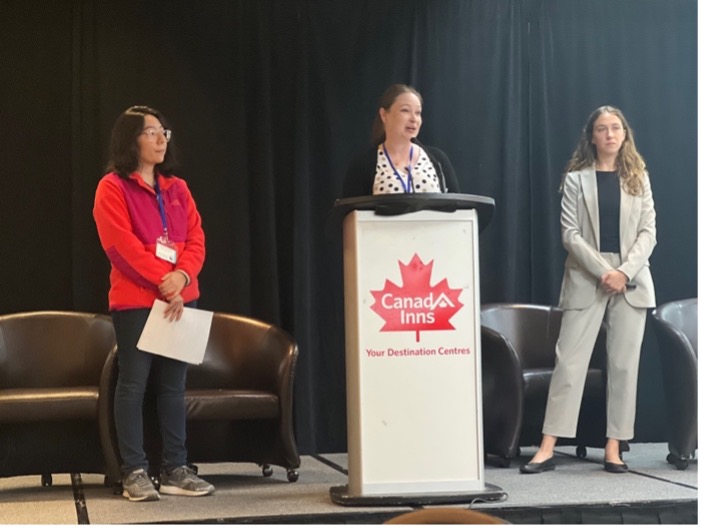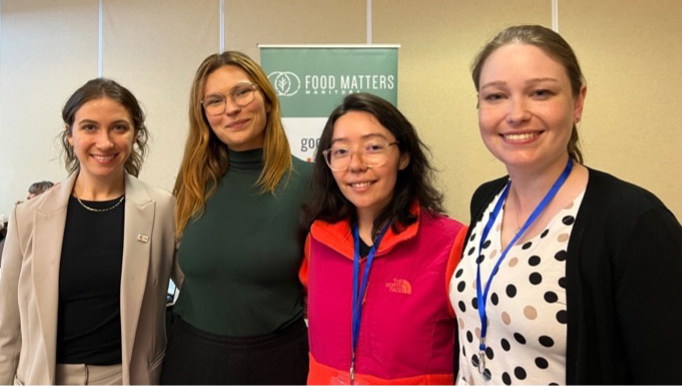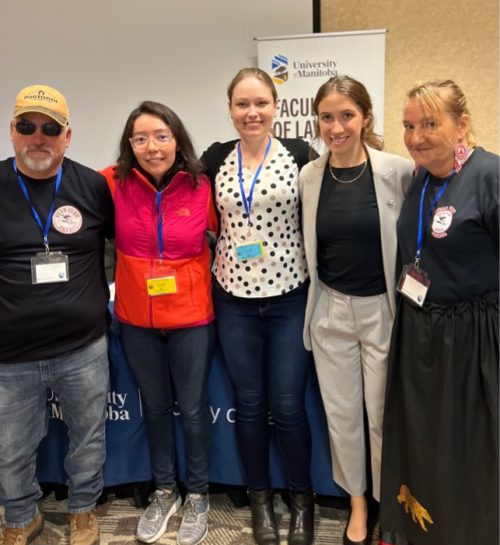
L. Kerry Vickar Business Law Clinic students speak at Northern Communities Trade Show. (L-R) Kassandra Taverner (2L), Lisa Haydey (2L), and Emily Palmer (2L).
Getting ready to help Northern communities
Business Law Clinic Students Attend the 51st Northern Association of Community Councils Annual General Assembly and Trade Show
On August 22 and 23, law students from the L. Kerry Vickar Business Law Clinic attended the 51st Northern Association of Community Councils (NACC) Annual General Assembly and Trade Show at Canad Inns Destination Centre Polo Park in Winnipeg. The NACC Annual General Assembly welcomed representatives from Northern Manitoba communities and others who support providing accessible services and resources to people living in Northern Manitoba.
NACC is a not-for-profit and CRA-registered charity representing 48 northern and remote community councils. It works for member communities to ensure that physical, social, and economic development in Northern communities remains a priority for government. NACC also works to share information on sustainability of natural resources and strengthens community connections to promote self-sufficiency in Northern Manitoba.
Over the two days, the students had the opportunity to present at the Annual General Assembly. Incoming 2L students Kassandra Taverner, Lisa Haydey, and Emily Palmer shared the purpose behind the L. Kerry Vickar Business Law Clinic and discussed the free legal resources available to serve all of Manitoba, including those in the North, who do not have access to a lawyer and cannot afford legal services.
The students spoke about their backgrounds, and shared an impactful story about a particular client, “Building Bridges for Newcomers Inc.,” whose work in assisting newcomers to Canada has been a particular inspiration to the Business Law Clinic students and reinforced the importance of helping others and the need for pro bono legal services. The students also announced the Manitoba Legal Clinic for the Arts – which will provide free legal services for artists and arts organizations, including those in Northern Manitoba.
Many people living in urban areas take many things for granted, such as accessible and affordable food options, healthcare, and education. But for people living in the Northern and remote areas of Manitoba, access can be a major and complex challenge, especially in the winter.

(L-R): Emily Palmer (2L), Morgan McCurdy, Kassandra Taverner (2L), Lisa Haydey (2L).
Morgan McCurdy, the Northern Facilitator for Food Matters Manitoba, made an impact on the students with her dedication and clarity of purpose. She recently graduated from the University of Winnipeg with a degree in Human Rights and is passionate about addressing food insecurity in Northern Manitoba.
Food Matters Manitoba is partnering with northern communities and providing “resources such as equipment and materials so that they can get out on the land to harvest (hunt, fish, trap, and gather) and feed their communities. Traditional harvesting draws on the strength, experience, knowledge, and largely unbroken traditions of Indigenous community members to drive the local food system.”
The students learned more about food insecurity facing Manitobans, and how northern and remote communities in Manitoba are more severely impacted due to things like high food prices and the long distances that food and people must travel to get to a store. More than 60% of Indigenous people living on reserve in Northern Manitoba are food insecure, compared to 14.4% of Manitobans who are food insecure. Through its vital work, Food Matters Manitoba is assisting communities in overcoming these challenges. You can find out more by visiting Food Matters Manitoba website.

(L-R): Kevin Walker, Kassandra Taverner (2L), Lisa Haydey (2L), Emily Palmer (2L), Angela Klassen.
The students were also moved by their conversations with Kevin Walker (executive director) and Angela Klassen from the Bear Clan Patrol. They described the importance of the Bear Clan Patrol’s initiative and why the organization is personally meaningful to them. According to their official website, “[the Patrol] came about as a result of the ongoing need to assume [their] traditional responsibility to provide security to [their] aboriginal community. Given that the Aboriginal population in Winnipeg is anywhere from 60,000 to 80,000, and is heavily concentrated in certain inner-city neighbourhoods, it was felt that the community must organize to keep the peace and to assist community members. The concept behind the patrol, then, is community people working with the community to provide personal security in the inner city in a non-threatening, non-violent, and supportive way.”
Emily Palmer talked about her takeaways from hearing Kevin and Angela’s powerful and touching stories, “There is great power in treating others well and small acts of kindness can make profound differences in the lives of others. Lisa, Kassie, and I are looking forward to learning more by attending a Bear Clan Patrol walk sometime very soon to see firsthand the important work that Bear Clan Patrol does every day to help others in need in the community!”
The students also met Shelley Napier and Paul Kentziger from Napier Emergency Consulting (NEC). They assist communities and organizations in building plans and programs to manage emergency events. Shelley and Paul are not only reflecting on past disasters and emergencies, but are also looking toward the future to prepare for bigger risks for people in Manitoba and across Canada.






